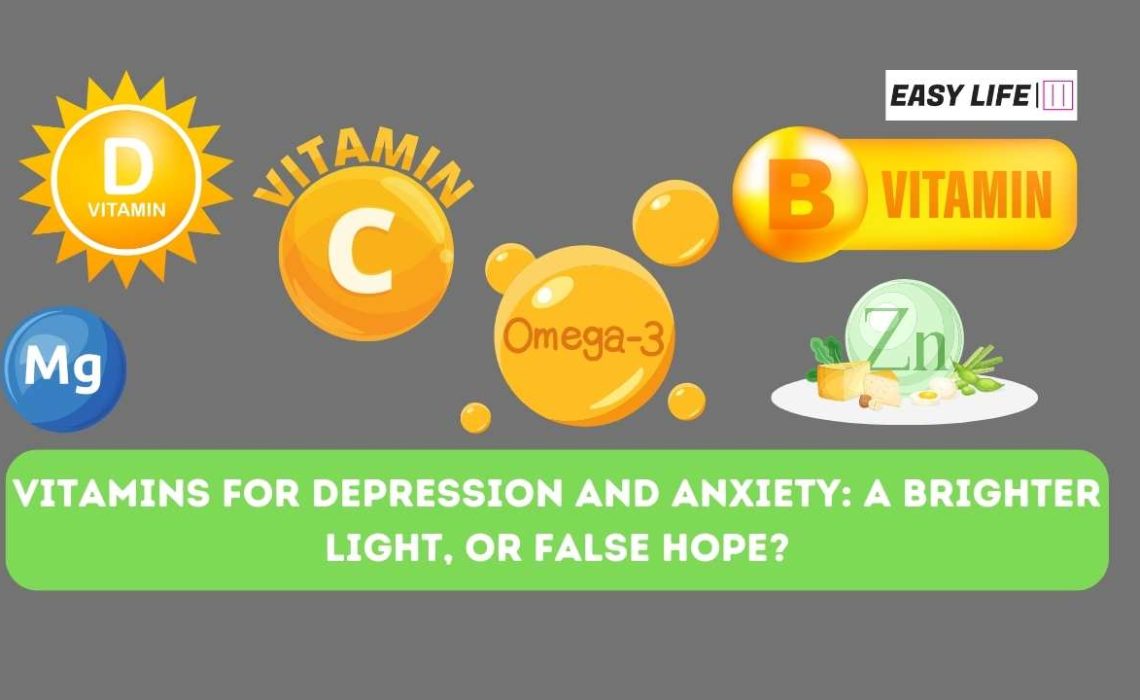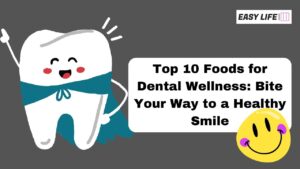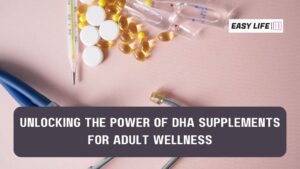Depression and anxiety have had a long-term impact on millions of people around the world. While obtaining professional aid is still essential, murmurs of “miracle cures” in the form of vitamins frequently entice individuals seeking relief. But can vitamins truly alleviate these bad moods? Let us shed some light on the facts concerning vitamins for depression and anxiety.
Table of Contents
ToggleTable of Contents: Vitamins for Depression and Anxiety
Understanding the Link Between Vitamins and Mental Health
In this extensive section, we look at the complex relationship between vitamins and mental health. Investigate the vital impact that various vitamins have in regulating neurotransmitters and maintaining general mental health. Learn why maintaining adequate vitamin levels is critical for preventing and treating symptoms of sadness and anxiety.
- Importance of Nutrients for Psychological Well-being: Discover the role of important nutrients in maintaining a healthy mind. Discover how vitamins help to synthesise neurotransmitters, which influences mood and emotional stability. This subsection provides an overview of the main nutrients that serve as building blocks for mental wellness.
- Overview of Vitamins in Alleviating Depression and Anxiety: Take a deeper look at how some vitamins can be effective allies in the fight against depression and anxiety. Understand the methods by which these vitamins interact with the brain, influencing cognition and emotion. This exploration lays the groundwork for a more in-depth look at particular vitamins and their distinct benefits to mental wellness.
Sunshine Inside, Vitamin D:

Low levels of vitamin D, or the “sunshine vitamin,” have been linked to depression and anxiety. Sunbathing isn’t always an option, so some studies show supplementation may be useful. However, study is still ongoing, and evidence is inconclusive. Always with your doctor before taking any supplements, especially if you have any other medical conditions.
B-Complex: A Team Effort:
B vitamins, particularly (B9) folate and B12, play important roles in neurotransmitter synthesis. Deficiencies may be connected with mental disorders. According to research, taking these vitamins in people with deficits may improve their symptoms. However, taking too many B vitamins can have negative consequences, therefore correct dosage supervision from a healthcare practitioner is required.
Omega-3 Fatty Acids: The Brain’s Builders:
These “good fats” are essential for brain health and have demonstrated potential in treating depression and anxiety. According to research, they may improve the efficacy of standard therapies. Omega-3s are best obtained from fatty fish such as salmon and tuna, however some people may benefit from supplements. Again, see your doctor to decide the appropriate dose for you.

Vitamins Beyond the Buzz:
While additional vitamins, such as C, calcium, and iron, have been studied for their potential function in mood regulation, the evidence is sometimes sparse or contradictory. Avoid overhyped claims about “wonder vitamins” for mental wellness. A healthy diet rich in fruits, vegetables, and whole grains remains the cornerstone for both physical and mental health.
The Final Prescription:
Vitamins should not be considered a quick treatment for depression and anxiety. While some may provide assistance in some situations, they are not a substitute for expert help. If you are suffering from any of these diseases, you should schedule an appointment with your doctor. They may examine your specific requirements, offer evidence-based treatment choices, and advise you on the potential significance of vitamins in your instance.
Remember that anxiety and depression are complex issues. Treating patients properly necessitates a diverse strategy, not a single miraculous drug. Embrace self-care, form a strong support network, and seek professional assistance as needed. With the correct guidance and assistance, you may emerge from the darkness and into a better future.
Key Points for “Vitamins for Depression and Anxiety: A Brighter Light, or False Hope?”
Problem: Depression and anxiety are widespread, and people may seek unconventional solutions like vitamins.
Claim: Some vitamins have shown potential in managing depression and anxiety, but the evidence is limited and individualized.
Key Vitamins:
- Vitamin D: Linked to mood through sunlight exposure, supplementation might be helpful for deficient individuals.
- B vitamins (B9 & B12): Play roles in neurotransmitter production, deficiencies may exacerbate symptoms, supplementation can work for some.

- Omega-3 fatty acids: Build brain cells, promising for managing depression and anxiety, potentially enhance therapy.
Overall Message:
- Vitamins are not a cure-all.
- A balanced diet is crucial for mental health.
- Professional help is essential for proper diagnosis and treatment.
- Some vitamins may play a supporting role in specific cases with doctor’s guidance.
- Self-care and support networks are important.
Call to Action:
- Prioritize seeking professional help for depression and anxiety.
- Don’t rely solely on vitamins as a solution.
- Talk to your doctor about possible vitamin benefits in your case.
Bonus Bones:
- Emphasize the complex nature of depression and anxiety.
- Encourage a holistic approach to treatment.
- Offer a message of hope and support for those struggling.
Conclusion: vitamins for depression and anxiety
While the promise of sunshine in a pill is appealing, the truth of vitamins for depression and anxiety is complex. While some evidence suggests that specific vitamins may be beneficial in some circumstances, they are not a cure-all. Remember that depression and anxiety are complicated disorders that necessitate professional treatment and a comprehensive strategy. Encourage healthy habits, form supportive relationships, and seek medical advice. With the correct help, you can navigate the darkness and find your way to a better tomorrow.
This conclusion highlights the limitations of vitamins while also conveying an optimistic and practical message. It encourages readers to prioritise professional care and overall well-being. Feel free to personalise it by include a specific call to action, such as recommending resources for getting mental health support or emphasising the value of advocacy and self-compassion.









